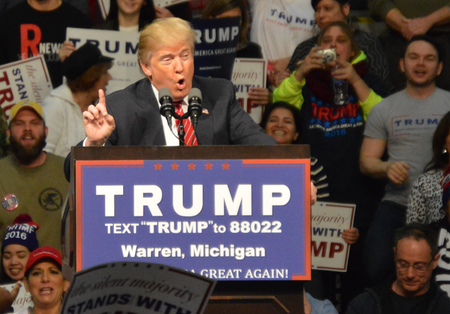What Is Truth And Does It Matter In 2016?
“The more evidence there is… the more conspiracy theorists believe everyone is in cahoots.”


This election has presented new and worrying challenges to those hoping to shed some light on the truth about the world in which we live.
Both candidates have been caught saying things that aren’t supported by facts.
But Donald Trump especially has constantly said things that are easily proven false, and continues to repeat them anyway – even after being called out on them.
This morning, The Atlantic magazine editor Jeffrey Goldberg told NPR, “We’ve moved into a new phase of the way in which truth is understood in part of the American polity, and that’s troubling.”
What is the truth? Is it subjective? And does the truth matter?
Charlotte Alter of TIME Magazine recently co-wrote an article titled “The Truth is Out There in 2016. Way Out There.” From that article:
Democratic societies function on faith in strangers–in police and judges to do their job without fear or favor; in government agencies to fairly enforce laws; and in experts of all stripes, from scientists to journalists to economists, to accurately report on what is happening in the world. Trump’s central argument is that faith has been lost, and he has put himself forward as the only solution. “We will never fix our rigged system by relying on the people who rigged it in the first place,” he says, when he takes the stage in Greenville.
One of the first casualties of this worldview is the very ability to have a national debate with a common set of facts.
Alter says part of what makes Donald Trump a successful candidate is he speaks the language of conspiracy theorists.
She says she understands the media also occasionally have a role in contorting or missing facts, and she says she’s not an apologist for the media. But she says most people choose the evidence they have before them, regardless of media reporting, and pick what they need to defend their point of view.
Alter says the issue of man-made climate change is a great example of this.
“The more evidence there is… [and] the more this becomes a general consensus… the more conspiracy theorists believe everyone is in cahoots.”
“The facts are the things that make propositions true when they are,” says Bruce Russell, a professor of philosophy at Wayne State University. “I think really what people ignore these days is not truth so much as evidence.”
Russell says a lack of evidence fuels conspiracy theories and theorists.
“I think they’re interested in having theories… and they don’t know how to assess sources.”
To hear more from Alter and Russell on Detroit Today, click on the audio player above.
